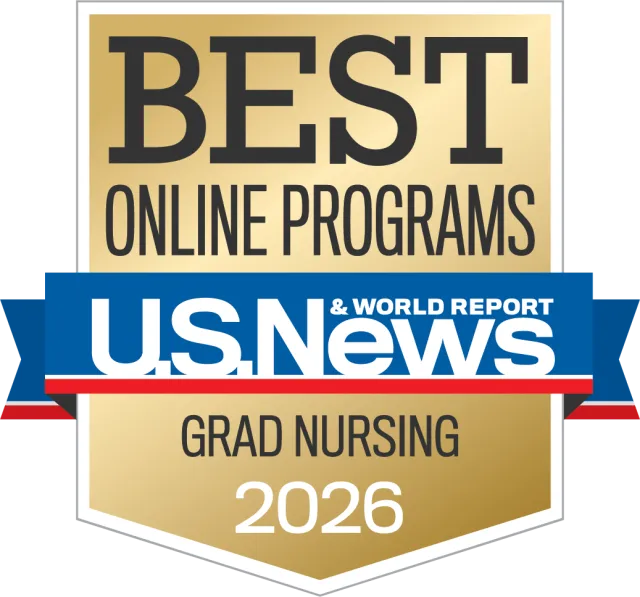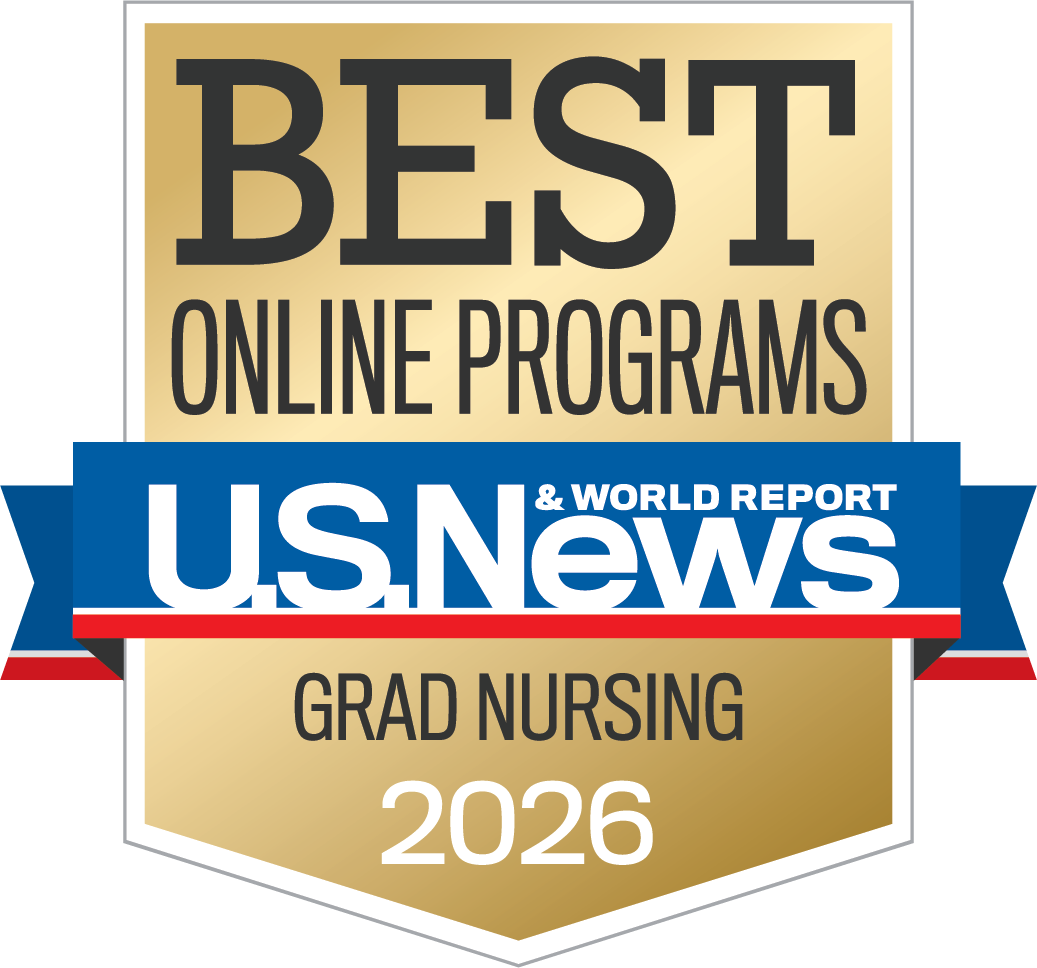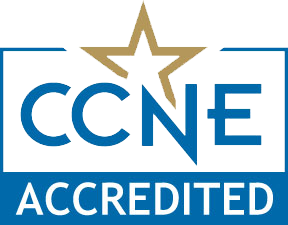Take your next career step with Herzing
| Accreditation | CCNE accredited,† Accredited by the Higher Learning Commission |
|---|---|
| Eligibility | Graduate degree in nursing required for admissions (MSN or DNP) |
| Format | 100% online coursework with hands-on clinical practicum experience |
| Clinicals | 630 clinical hours—Herzing pledges clinical placement |
| Certification | Prepare for the WHNP-BC exam from the National Certification Corporation |
| QuickPaths | Earn dual credit towards a Doctor of Nursing Practice (DNP); transfer credit, stackable credentials, and adaptive learning build a faster pathway to a higher education with Herzing University |
Learn More Today!

Ranked by U.S. News & World Report as one of the best online graduate nursing programs in 2026
Find new footing in advanced practice nursing as a women’s health nurse practitioner
Build upon your current education and experience as a master’s-prepared RN and pursue a fulfilling, exciting career as a WHNP. Our post master’s certificate program combines online didactic coursework with hands-on clinical practicum experiences near you to prepare you for WHNP certification—and success in your work right from the start.
Focus your study on women’s health and discover a new specialty as a primary care provider. Embrace a new role championing women’s health as a nurse practitioner.
Career-focused curriculum
Discover the crucial knowledge and skills required to succeed in your work and build a foundation for continued career growth.
Flexible schedule
We work hard to help you maintain school-life balance, striving to be as flexible as possible for busy non-traditional students.
Virtual services
Access to extensive virtual services, including academic advising, tutoring, support services, technical support and library services.
Lifelong support
We support your ongoing career advancement by providing comprehensive, personalized student services with lifelong career coaching.
Rolling admissions
No application deadlines to worry about. Apply when you’re ready and prepare to get started soon.
Curriculum
Post master's certificate in WHNP classes & curriculum details
All didactic lecture-style courses are delivered 100% online. You will also be required to complete 630 clinical practicum hours.
| Program | Months i | Semester Credits |
|---|---|---|
| Post Master's Certificate in Women's Health Nurse Practitioner | 20 | 39 |
i. Average number of months for students to complete program.
Required Direct Care Courses
All courses, 9.00 semester credit hours, are required.
Required Specialty Courses
All courses, 30.00 semester credit hours, are required.
Clinical Proficiency Exam and Policy Courses
The following courses are 0.00 semester credit hours associated with the policy outlined above. Students are required to take as co-requisite courses along with NU 611, NU 642, NU 664 or NU 671, depending on the program of study. NSG 0600 - Clinical Proficiency Course Semester Credit Hours: 0.00 NSG 0600R - Clinical Proficiency Remediation Course (if needed) Semester Credit Hours: 0.00
Tuition & Cost
Tuition & Cost
The cost of tuition for the post master's WHNP program is $770 per credit.
You can potentially earn even greater savings by transferring credit from prior college coursework, applying for financial aid, or potential partnership opportunities through your employer.
Our goal is your career advancement. That’s why we are always working to improve our curriculum and processes to make our program as affordable as possible while preparing you best for success in your work.
Scholarships & Financial Aid
You may be eligible for multiple scholarships and grants, both through Herzing University and several national scholarship websites.
Military/Veteran Discounts
Veterans, Active Duty U.S. Servicemembers, and spouses may qualify for a 10-20% tuition discount.
Admissions Requirements
Enrollment in the post master’s certificate nursing program is open to registered nurses who:
- Hold a graduate degree in nursing from an accredited university or college (such as a master’s or doctoral degree)
- Hold a current, active and unrestricted license as a registered nurse in the state in which they live (Note: Holding a multi-state, compact state license and being a resident in a compact license state will be deemed to have met this requirement).
We Pledge Clinical Placement
Worried about clinical placement? You don't have to be.
At Herzing, clinical placement is built into your experience—because it's essential, and you deserve a program that treats it that way.
There's no guesswork. Just a proven framework backed by a promise. Our promise is your placement.

Accreditation & Recognition
Our accredited & recognized online school
We strive to earn rank as one of the top private, nonprofit universities in the United States. Just as you work every day to become the best version of yourself, so do we as a university.
We are proud to have attained institutional and programmatic accreditation in addition to industry recognition for our accomplishments helping students earn a college education and find career success.
✝The post-masters APRN certificate programs at Herzing University Madison are accredited by the Commission on Collegiate Nursing Education (http://www.ccneaccreditation.org). Herzing University is approved to offer programs in an online learning modality through association with the main campus in Madison, Wisconsin.

Ranked by U.S. News & World Report among the best online graduate nursing degree programs in 2026.
Herzing University is institutionally accredited by the Higher Learning Commission (hlcommission.org), a regional accreditation agency recognized by the U.S. Department of Education.
Waived Enrollment Fee
Discover the educational pathway designed to maximize your career potential. Reach for greater heights with Herzing University.
Faq
Frequently Asked Questions
Didn't find the answer to your question? Send us an inquiry and we will be happy to answer all your questions!
The goal is to fully prepare you for success in your work as a WHNP. Clinicals are completed as part of specialty WHNP courses to best establish concepts learned in didactic courses and immediately apply your learning to real-life direct patient care in a precepted clinical site.
Every student in the WHNP program is subject to a clinical proficiency exam after completing Advanced Health Assessment, Advanced Pathophysiology, and Advanced Pharmacology. This ensures a strong foundational knowledge prior to entering the specialty clinical courses towards a WHNP.
There are benchmarks and assessments throughout the program to help ensure you’re on the right track. We work closely with every student to help them fully prepare for success as a WHNP. You are afforded the opportunity to learn and work with other women's health providers to gain real life knowledge and experience to prepare you as you enter your own practice.
According to the Bureau of Labor Statistics, nurse practitioners earn an average salary of $132,000 per year ($63.46 per hour). Pay depends on many factors, including your location, what healthcare institution you work for and your level of experience.*
Discover the average nurse practitioner salary by state and find out what nurse practitioners make on average near you. Salaries can vary between specialties, and the BLS does not provide a specific estimate for WHNP.
A women’s health nurse practitioner is an advanced practice registered nurse (APRN) who provides holistic care for women from puberty through the adult lifespan. WHNPs concentrate their care on gynecologic, obstetric, sexual, and reproductive health.
They provide care both individually and collaboratively as members of a healthcare team. WHNPs may consult with additional healthcare professionals regarding how non-gynecologic conditions (and their treatment) can impact reproductive and sexual health.
Learn more about general WHNP roles and responsibilities.
Yes, an FNP is educated and trained to work with all types of patients across the lifespan, so they can potentially provide women’s health care.
However, an FNP curriculum includes topics in adult, geriatric, and pediatric care which may not be as relevant for those focused on women’s health only. The FNP curriculum includes women’s health, but our WHNP curriculum greatly expands on this to provide greater preparation for success both on the WHNP certification exam and success in your first WHNP job.
Both WHNP and certified nurse midwives (CNM) are advanced practice nurses with specialized roles for women, but they have unique focuses in terms of scope of practice.
Women’s health nurse practitioners specialize in providing primary health care to women across the lifespan, while nurse midwives are more focused strictly on the pregnancy, childbirth, and the postpartum period. Midwives may deliver babies, but WHNP cannot.
Each has their own unique certification and educational requirements, as well as differences in salary potential.
Learn more about the primary differences between a WHNP and certified nurse midwife.
The National Association of Nurse Practitioners in Women’s Health’s Guidelines for Practice and Education outline a large list of WHNP competencies across several important categories:
- Client-centered care
- Primary care
- Women’s gynecologic, sexual, reproductive, menopause-transition, and post-menopause healthcare
- Male sexual and reproductive healthcare
- Obstetric care
- Professional role
The 2018 NPWH Women’s Health Nurse Practitioner Workforce Demographics and Compensation Survey highlights several environments in which WHNPs practice, including:
- Private practice offices
- Community health centers
- Hospital-based clinics
- Academic medical centers
- Schools and colleges
- Correctional facilities
- Inpatient settings
- Patients’ homes
WHNPs may work in urban, suburban, or rural areas, and may also potentially provide telehealth services (remote care).
Here’s a selection of the most common types of nurse practitioners:
- Family Nurse Practitioner (FNP)
- Adult Gerontology Acute Care Nurse Practitioner (AGACNP)
- Adult Gerontology Primary Care Nurse Practitioner (AGPCNP)
- Pediatric Nurse Practitioner (PNP)
- Psychiatric Mental Health Nurse Practitioner (PMHNP)
- Women’s Health Nurse Practitioner (WHNP)
Each specialty has its own unique requirements in terms of job experience and certification.
According to the 2018 NPWH Women’s Health Nurse Practitioner Workforce Demographics and Compensation Survey, the significant majority of WHNP describe direct patient care as their primary role (84%).
Some WHNP may work in academia, management/administration, research, or health policy/advocacy.
However, at this time there are no separate certifications for different types of WHNP: only the primary WHNP-BC certification from the National Certification Corporation (NCC).
Precise scope of practice can vary by state and employer. The American Associate of Nurse Practitioners (AANP) provides a brief summary of the scope of practice common to all nurse practitioners.
You may have some initial questions about what a WHNP can and can’t do. For instance, can WHNP…
- Write prescriptions? Yes, nurse practitioners may write prescriptions.
- See male patients? Yes, some WHNPs may treat men. WHNPs are educationally prepared to care for individuals inclusive of sex, gender, or sexual orientation.
- Deliver babies? No, only midwives or obstetricians (Obstetrics and Gynecology - OBGYN) can deliver babies.
- Prenatal care? Yes, WHNP can provide pregnancy testing, fertility evaluation, prenatal visits, and postpartum care.
- Be called an “OBGYN” nurse practitioner? Some WHNP may be informally regarded as an OBGYN NP if their care focuses primarily on the pregnancy, childbirth, and postpartum period. However, no WHNP has the same scope of practice as an OBGYN physician (or nurse midwife).
- Do mammograms? No. WHNP can order mammograms but they do not perform the actual exams.
You’ll learn more specifics over the course of the WHNP program.
Program Finder
Post Master's Certificate - Women's Health Nurse Practitioner
OnlineTo learn more about this program, click the Request Info button.
The Student Experience at Herzing
It all went by super fast, and I can’t believe I’m getting started on my new career already!
Eli Trejo
Nursing | Kenosha CampusBeing a mother and working full-time while going to school full-time was extremely taxing, but Herzing give me the resources and the support I needed to push through. I was able to complete my BSN in two years, and I will be re-enrolling with Herzing to earn my master’s in nursing (MSN) degree.
Carla Bourelly
Nursing | Atlanta CampusThroughout this experience, I realized I was stronger than I thought I was. Through all the hardships, I persevered and conquered my dreams despite all the obstacles.
Ketha Franklin-Frost
Nursing | Online CampusThe program is only a short period in your life, but the impact on your career will last a lifetime.
Stacie Pruett
Nursing | Online CampusMy passion for education is endless, and given the chance, I would always participate in it in some way, shape, and/or form.
Joanna Hogan
Nursing | Online CampusAccreditation & Disclosures
Not all programs are approved in all states. Individuals considering the Post Master’s Certificate Pediatric Nurse Practitioner (PNP) program should be aware that state requirements for availability of required clinical courses and eligibility to apply for licensure as a pediatric nurse practitioner vary from state to state. Applicants should check with their applicable state board of nursing before enrolling in any graduate nursing program.
Herzing University is approved to offer programs in an online learning modality through association with the Main Campus in Madison, Wisconsin (Madison Campus). Degrees for these programs are conferred by Herzing’s Madison Campus.
* BLS pay estimates calculate the median annual wage for various occupations. Per the BLS the median wage for an occupation is: "The wage at which half of the workers in the occupation earned more than that amount, and half earned less. Median wage data are from the BLS Occupational Employment and Wage Statistics survey." Bureau of Labor Statistics (BLS), U.S. Department of Labor, Occupational Outlook Handbook 2024. BLS median wage estimates do not represent entry-level wages and/or salaries. Multiple factors, including prior experience, age, geographic market in which you want to work, and degree level and field, will affect career outcomes, including starting salary and earnings as an experienced employee. Herzing neither represents that its graduates will earn the median salaries calculated by BLS for a particular job nor guarantees that graduation from its program will result in a job, promotion, particular wage or salary, or other career growth.
Recent Blog Posts
Waived Enrollment Fee
Discover the educational pathway designed to maximize your career potential. Reach for greater heights with Herzing University.







